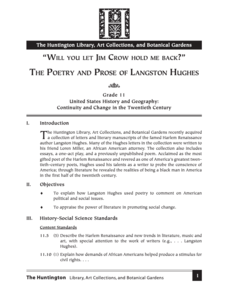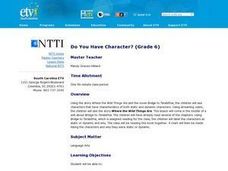Curated OER
Determining Author's Point of View: The Sneeches
Determine the author's point of view in a text. Young readers read Dr. Seuss' The Sneeches and identify the author's purpose in the story. They identify persuasive techniques in writing, asking and answering questions to better...
Curated OER
Children's Media and Censorship
High schoolers form opinions about children and television censorship after analyzing literature. They complete a journal writing activity to identify the topic and make a list of inappropriate television shows for children. Next, they...
Curated OER
Things Aren't Always What They Seem
Students use video and the Internet to make predictions, draw conclusions, determine conflict and point of view while reading a short story. In this short story analysis lesson, students watch a related video and complete a prediction...
Japan Society
Akutagawa Ryunosuke and the Taisho Modernists
Japan's Taisho Period was a time when authors like Akutagawa and other Japanese modernists began to experiment with point of view and literary form, making the literature produced during this time period a natural choice for teaching...
Curated OER
A Plump and Perky Turkey
Help readers recognize elements in a story. They will use pictures and text to gain meaning from written material. Have learners listen to the story A Plump and Perky Turkey and participate in a discussion. They recognize the Internet...
Huntington Library
The Poetry and Prose of Langston Hughes
Eleventh graders discover the poetry of Langston Hughes. In this social issues lesson plan, 11th graders experience the views of Langston Hughes. Students read Hughes' poetry and discuss the basic theme. Students evaluate the political,...
Curated OER
Caldecott Medal Winners
Second graders identify Caldecott Medal winners. In this library media lesson, 2nd graders view an overhead transparency of Caldecott Medal winners from 1987-2004 and answer questions based on the data that is displayed.
Curated OER
Introduction To Literary Analysis
Explore the fascinating ways in which authors use specific literary devices to create interesting and realistic texts. Using non-fiction articles with the subject of rogue waves, an excerpt from The Perfect Storm, by Sebastian Junger,...
Curated OER
What Are the Advantages and Disadvantages of Conforming?
Dive into Arthur Miller’s The Crucible and determine what it means to conform in society, and discuss as a group with the thoughts and plans available in these documents. Included are multiple activities and brain targets that form the...
Curated OER
Unit Plan for Mark Twain and American Humor
Students create brochures about the humor of Mark Twain. In this literature-analysis lesson plan, students read "The Celebrated Jumping Frog of Calaveras County" and other short stories by Twain. Students write analytical paragraphs and...
Curated OER
The Stinky Cheese Man and Other Fairly Stupid Tales
Sixth graders demonstrate the ability to process and evaluate content from a variety of sources and apply comprehension skills to the material read. They organize information for practical use and design and develop an informational...
Curated OER
Do You Have Character?
Sixth graders read Katherine Paterson's novel, Bridge to Terabithia, and watch a video of Maurice Sendak's book, Where the Wild Things Are. They examine the characters in both stories that share similar characteristics. Students use the...
Curated OER
The Bus Ride Teacher's Guide
Students examine and respond to the text, The Bus Ride. In this African-American literature lesson, students explore pre-reading questions that focus on fairness of laws. Students read the text based on Rosa Parks and answer 11...














